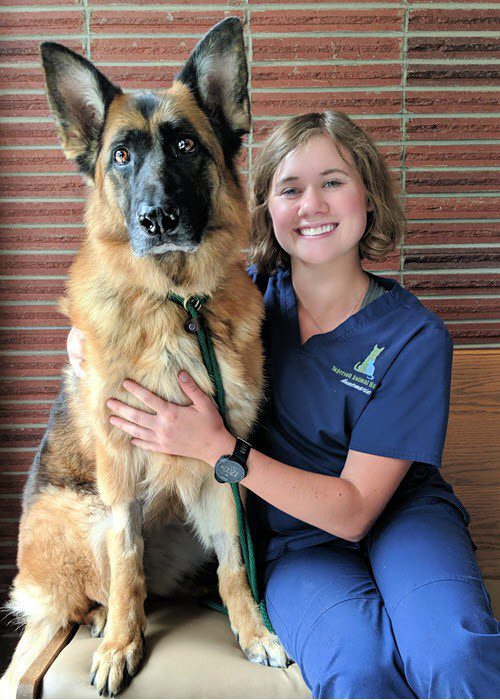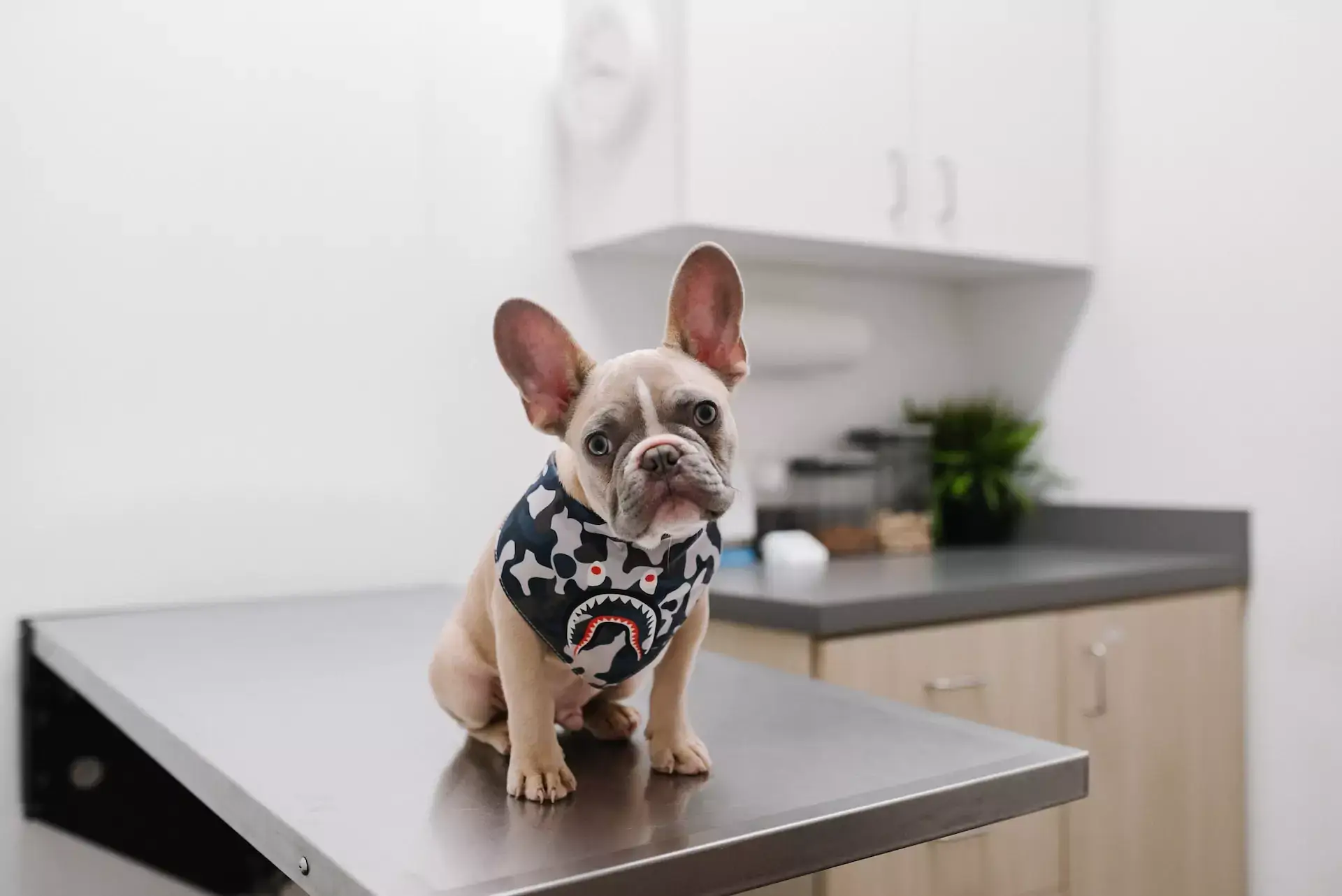Heat Stroke in Dogs
June 27, 2019
Iowa summers are wonderful for outdoor activities and relaxing in the shade or by the pool. There are so many great family activities to participate in, and pets are an integral part of the family equation. But how do you keep your pet safe in the summer months – especially when you want to include them in the fun? And what can happen when your pet plays too hard or gets too hot?
Heatstroke. You’ve heard your vet tell you to watch out for it. To make sure it doesn’t happen. But what is heatstroke? Heatstroke (or Hyperthermia) is a condition marked by fever and often, unconsciousness, due to the body’s failure to regulate temperature. Simply put, it is the body’s reaction to failing to cool itself.
Any hot environment can lead to heatstroke in dogs. At Ingersoll Animal Hospital we most commonly see these symptoms in dogs that have been left in cars, or simply dogs who have been active outside without adequate rest or breaks.
 This is Annemarie and her beautiful German Shepherd companion, Meika. Annemarie asked me to share their story to spread awareness about the signs, symptoms, and seriousness of heatstroke.
Annemarie is an avid runner, going on runs daily and even participating in marathons. Meika loves to accompany Annemarie and is very accustomed to running right by her side. When getting ready for a run Meika circles, paces, and yodels – refusing to be ignored, and this particular spring day was no exception.
After getting ready, Annemarie took a quick glance outside. Overcast but humid. Could be better but could be worse. She debated for a moment whether or not to bring Meika along, but her persistence and that “don’t-leave-me-behind” face won her over. Meika was, after all, an experienced runner herself.
The jog was their typical length if not shorter – about an hour and they were back home, nothing out of the ordinary. But it was when they got back that Annemarie realized something wasn’t right. Meika slowed down – way down. She offered her water and Meika took a few laps and then refused. She became unsteady, laid down, and progressed to being unresponsive, going from bad to worse in a matter of moments.
Annemarie knew she had to act fast and started to pour room-temperature water over Meika’s thick coat of fur in the hopes of cooling her down. She called us and described the situation and Meika’s current state and because Meika had deteriorated so quickly and was already unresponsive, it was vital to get her to the emergency clinic immediately.
At the emergency clinic Mieka was carried in on a stretcher. She was taken dirctly to the treatment area and assessed by their veterinarian. Things weren’t looking good. Annemarie felt a tremendous weight of guilt and blamed herself for not knowing better – for not saying no this time – and wanted more than anything to take it back or make it better.
Things were happening fast and slow at the same time. Decisions regarding whether to resuscitate, discussions about pain and transfusions all happened around her. Meika was given a “guarded” and then “grave” prognosis. Annemarie prepared for the worst.
Yet somehow, against all odds, Meika improved. Annemarie was advised that sometimes animals show a brief period of improvement before experiencing DIC (disseminated intravascular coagulation) – a common secondary complication of heatstroke which causes an inability to clot blood normally. Again, Meika refused to give up. By the second day of hospitalization and round-the-clock care, Annemarie was greeted in the exam room by Meika herself, who walked in cautiously but almost as though nothing had happened.
But it had – and it was the scariest thing Annemarie and Meika had ever been through. Meika was released on day 3 and is continuing to improve daily. Annemarie has been diligent about keeping her activity restricted, giving medication, and rechecking her lab work.
Meika beat the odds. It’s been almost a month and Meika isn’t 100% – but she’s close. She’s very, very lucky. Annemarie acted fast and did everything right – from cooling her down with the room-temperature water (too cold can lead to shock), to calling the vet and getting her to the emergency clinic. These steps probably saved Meika’s life. And now it’s Annemarie’s goal to make sure this doesn’t happen to other pets.
The best way to prevent heatstroke may be to leave your pet at home. Your dog loves you and thinks you’re pretty great, but that means they may want to be active with you beyond what is good for their health. They often don’t know their own limitations. If your dog is the constantly-active, energetic type – they will likely have a hard time knowing when to stop. And if your dog isn’t the overly-active type – they might prefer the AC at home anyway.
If you do decide to incorporate your dog in your summer fun – be sure to have a constant supply of water and a consistent source of shade. Take regular breaks so you can be sure your pet is stopping to rest. Be aware of the symptoms of heat stroke (excessive panting, drooling, reddened gums, vomiting, diarrhea, uncoordinated movement, and collapse) and be diligent about checking on your furry family member regularly. Never leave them unattended for any length of time. Above all else – never leave your dog in a car with the windows closed, even if it is parked in the shade.
Know your dog! Some pets are at more of a risk for heat stroke because of their breed, body condition, age, medical condition(s), or coat. For example, dogs with short noses (brachycephalic breeds) are less able to cool themselves and are more susceptible because of this.
Lastly, know who to call in the event of an emergency. Keep your vet clinic phone number stored in your phone and be aware of the locations of your local emergency veterinary clinics. Don’t hesitate to call someone if your pet is acting abnormally – you know your pet better than anyone!
Keeping pets safe in the summer is very important to us at Ingersoll Animal Hospital and we hope that this information will help keep your pet safe this summer and for many to come.
Erin Minor, Office Manager
Ingersoll Animal Hospital
This is Annemarie and her beautiful German Shepherd companion, Meika. Annemarie asked me to share their story to spread awareness about the signs, symptoms, and seriousness of heatstroke.
Annemarie is an avid runner, going on runs daily and even participating in marathons. Meika loves to accompany Annemarie and is very accustomed to running right by her side. When getting ready for a run Meika circles, paces, and yodels – refusing to be ignored, and this particular spring day was no exception.
After getting ready, Annemarie took a quick glance outside. Overcast but humid. Could be better but could be worse. She debated for a moment whether or not to bring Meika along, but her persistence and that “don’t-leave-me-behind” face won her over. Meika was, after all, an experienced runner herself.
The jog was their typical length if not shorter – about an hour and they were back home, nothing out of the ordinary. But it was when they got back that Annemarie realized something wasn’t right. Meika slowed down – way down. She offered her water and Meika took a few laps and then refused. She became unsteady, laid down, and progressed to being unresponsive, going from bad to worse in a matter of moments.
Annemarie knew she had to act fast and started to pour room-temperature water over Meika’s thick coat of fur in the hopes of cooling her down. She called us and described the situation and Meika’s current state and because Meika had deteriorated so quickly and was already unresponsive, it was vital to get her to the emergency clinic immediately.
At the emergency clinic Mieka was carried in on a stretcher. She was taken dirctly to the treatment area and assessed by their veterinarian. Things weren’t looking good. Annemarie felt a tremendous weight of guilt and blamed herself for not knowing better – for not saying no this time – and wanted more than anything to take it back or make it better.
Things were happening fast and slow at the same time. Decisions regarding whether to resuscitate, discussions about pain and transfusions all happened around her. Meika was given a “guarded” and then “grave” prognosis. Annemarie prepared for the worst.
Yet somehow, against all odds, Meika improved. Annemarie was advised that sometimes animals show a brief period of improvement before experiencing DIC (disseminated intravascular coagulation) – a common secondary complication of heatstroke which causes an inability to clot blood normally. Again, Meika refused to give up. By the second day of hospitalization and round-the-clock care, Annemarie was greeted in the exam room by Meika herself, who walked in cautiously but almost as though nothing had happened.
But it had – and it was the scariest thing Annemarie and Meika had ever been through. Meika was released on day 3 and is continuing to improve daily. Annemarie has been diligent about keeping her activity restricted, giving medication, and rechecking her lab work.
Meika beat the odds. It’s been almost a month and Meika isn’t 100% – but she’s close. She’s very, very lucky. Annemarie acted fast and did everything right – from cooling her down with the room-temperature water (too cold can lead to shock), to calling the vet and getting her to the emergency clinic. These steps probably saved Meika’s life. And now it’s Annemarie’s goal to make sure this doesn’t happen to other pets.
The best way to prevent heatstroke may be to leave your pet at home. Your dog loves you and thinks you’re pretty great, but that means they may want to be active with you beyond what is good for their health. They often don’t know their own limitations. If your dog is the constantly-active, energetic type – they will likely have a hard time knowing when to stop. And if your dog isn’t the overly-active type – they might prefer the AC at home anyway.
If you do decide to incorporate your dog in your summer fun – be sure to have a constant supply of water and a consistent source of shade. Take regular breaks so you can be sure your pet is stopping to rest. Be aware of the symptoms of heat stroke (excessive panting, drooling, reddened gums, vomiting, diarrhea, uncoordinated movement, and collapse) and be diligent about checking on your furry family member regularly. Never leave them unattended for any length of time. Above all else – never leave your dog in a car with the windows closed, even if it is parked in the shade.
Know your dog! Some pets are at more of a risk for heat stroke because of their breed, body condition, age, medical condition(s), or coat. For example, dogs with short noses (brachycephalic breeds) are less able to cool themselves and are more susceptible because of this.
Lastly, know who to call in the event of an emergency. Keep your vet clinic phone number stored in your phone and be aware of the locations of your local emergency veterinary clinics. Don’t hesitate to call someone if your pet is acting abnormally – you know your pet better than anyone!
Keeping pets safe in the summer is very important to us at Ingersoll Animal Hospital and we hope that this information will help keep your pet safe this summer and for many to come.
Erin Minor, Office Manager
Ingersoll Animal Hospital
 This is Annemarie and her beautiful German Shepherd companion, Meika. Annemarie asked me to share their story to spread awareness about the signs, symptoms, and seriousness of heatstroke.
Annemarie is an avid runner, going on runs daily and even participating in marathons. Meika loves to accompany Annemarie and is very accustomed to running right by her side. When getting ready for a run Meika circles, paces, and yodels – refusing to be ignored, and this particular spring day was no exception.
After getting ready, Annemarie took a quick glance outside. Overcast but humid. Could be better but could be worse. She debated for a moment whether or not to bring Meika along, but her persistence and that “don’t-leave-me-behind” face won her over. Meika was, after all, an experienced runner herself.
The jog was their typical length if not shorter – about an hour and they were back home, nothing out of the ordinary. But it was when they got back that Annemarie realized something wasn’t right. Meika slowed down – way down. She offered her water and Meika took a few laps and then refused. She became unsteady, laid down, and progressed to being unresponsive, going from bad to worse in a matter of moments.
Annemarie knew she had to act fast and started to pour room-temperature water over Meika’s thick coat of fur in the hopes of cooling her down. She called us and described the situation and Meika’s current state and because Meika had deteriorated so quickly and was already unresponsive, it was vital to get her to the emergency clinic immediately.
At the emergency clinic Mieka was carried in on a stretcher. She was taken dirctly to the treatment area and assessed by their veterinarian. Things weren’t looking good. Annemarie felt a tremendous weight of guilt and blamed herself for not knowing better – for not saying no this time – and wanted more than anything to take it back or make it better.
Things were happening fast and slow at the same time. Decisions regarding whether to resuscitate, discussions about pain and transfusions all happened around her. Meika was given a “guarded” and then “grave” prognosis. Annemarie prepared for the worst.
Yet somehow, against all odds, Meika improved. Annemarie was advised that sometimes animals show a brief period of improvement before experiencing DIC (disseminated intravascular coagulation) – a common secondary complication of heatstroke which causes an inability to clot blood normally. Again, Meika refused to give up. By the second day of hospitalization and round-the-clock care, Annemarie was greeted in the exam room by Meika herself, who walked in cautiously but almost as though nothing had happened.
But it had – and it was the scariest thing Annemarie and Meika had ever been through. Meika was released on day 3 and is continuing to improve daily. Annemarie has been diligent about keeping her activity restricted, giving medication, and rechecking her lab work.
Meika beat the odds. It’s been almost a month and Meika isn’t 100% – but she’s close. She’s very, very lucky. Annemarie acted fast and did everything right – from cooling her down with the room-temperature water (too cold can lead to shock), to calling the vet and getting her to the emergency clinic. These steps probably saved Meika’s life. And now it’s Annemarie’s goal to make sure this doesn’t happen to other pets.
The best way to prevent heatstroke may be to leave your pet at home. Your dog loves you and thinks you’re pretty great, but that means they may want to be active with you beyond what is good for their health. They often don’t know their own limitations. If your dog is the constantly-active, energetic type – they will likely have a hard time knowing when to stop. And if your dog isn’t the overly-active type – they might prefer the AC at home anyway.
If you do decide to incorporate your dog in your summer fun – be sure to have a constant supply of water and a consistent source of shade. Take regular breaks so you can be sure your pet is stopping to rest. Be aware of the symptoms of heat stroke (excessive panting, drooling, reddened gums, vomiting, diarrhea, uncoordinated movement, and collapse) and be diligent about checking on your furry family member regularly. Never leave them unattended for any length of time. Above all else – never leave your dog in a car with the windows closed, even if it is parked in the shade.
Know your dog! Some pets are at more of a risk for heat stroke because of their breed, body condition, age, medical condition(s), or coat. For example, dogs with short noses (brachycephalic breeds) are less able to cool themselves and are more susceptible because of this.
Lastly, know who to call in the event of an emergency. Keep your vet clinic phone number stored in your phone and be aware of the locations of your local emergency veterinary clinics. Don’t hesitate to call someone if your pet is acting abnormally – you know your pet better than anyone!
Keeping pets safe in the summer is very important to us at Ingersoll Animal Hospital and we hope that this information will help keep your pet safe this summer and for many to come.
Erin Minor, Office Manager
Ingersoll Animal Hospital
This is Annemarie and her beautiful German Shepherd companion, Meika. Annemarie asked me to share their story to spread awareness about the signs, symptoms, and seriousness of heatstroke.
Annemarie is an avid runner, going on runs daily and even participating in marathons. Meika loves to accompany Annemarie and is very accustomed to running right by her side. When getting ready for a run Meika circles, paces, and yodels – refusing to be ignored, and this particular spring day was no exception.
After getting ready, Annemarie took a quick glance outside. Overcast but humid. Could be better but could be worse. She debated for a moment whether or not to bring Meika along, but her persistence and that “don’t-leave-me-behind” face won her over. Meika was, after all, an experienced runner herself.
The jog was their typical length if not shorter – about an hour and they were back home, nothing out of the ordinary. But it was when they got back that Annemarie realized something wasn’t right. Meika slowed down – way down. She offered her water and Meika took a few laps and then refused. She became unsteady, laid down, and progressed to being unresponsive, going from bad to worse in a matter of moments.
Annemarie knew she had to act fast and started to pour room-temperature water over Meika’s thick coat of fur in the hopes of cooling her down. She called us and described the situation and Meika’s current state and because Meika had deteriorated so quickly and was already unresponsive, it was vital to get her to the emergency clinic immediately.
At the emergency clinic Mieka was carried in on a stretcher. She was taken dirctly to the treatment area and assessed by their veterinarian. Things weren’t looking good. Annemarie felt a tremendous weight of guilt and blamed herself for not knowing better – for not saying no this time – and wanted more than anything to take it back or make it better.
Things were happening fast and slow at the same time. Decisions regarding whether to resuscitate, discussions about pain and transfusions all happened around her. Meika was given a “guarded” and then “grave” prognosis. Annemarie prepared for the worst.
Yet somehow, against all odds, Meika improved. Annemarie was advised that sometimes animals show a brief period of improvement before experiencing DIC (disseminated intravascular coagulation) – a common secondary complication of heatstroke which causes an inability to clot blood normally. Again, Meika refused to give up. By the second day of hospitalization and round-the-clock care, Annemarie was greeted in the exam room by Meika herself, who walked in cautiously but almost as though nothing had happened.
But it had – and it was the scariest thing Annemarie and Meika had ever been through. Meika was released on day 3 and is continuing to improve daily. Annemarie has been diligent about keeping her activity restricted, giving medication, and rechecking her lab work.
Meika beat the odds. It’s been almost a month and Meika isn’t 100% – but she’s close. She’s very, very lucky. Annemarie acted fast and did everything right – from cooling her down with the room-temperature water (too cold can lead to shock), to calling the vet and getting her to the emergency clinic. These steps probably saved Meika’s life. And now it’s Annemarie’s goal to make sure this doesn’t happen to other pets.
The best way to prevent heatstroke may be to leave your pet at home. Your dog loves you and thinks you’re pretty great, but that means they may want to be active with you beyond what is good for their health. They often don’t know their own limitations. If your dog is the constantly-active, energetic type – they will likely have a hard time knowing when to stop. And if your dog isn’t the overly-active type – they might prefer the AC at home anyway.
If you do decide to incorporate your dog in your summer fun – be sure to have a constant supply of water and a consistent source of shade. Take regular breaks so you can be sure your pet is stopping to rest. Be aware of the symptoms of heat stroke (excessive panting, drooling, reddened gums, vomiting, diarrhea, uncoordinated movement, and collapse) and be diligent about checking on your furry family member regularly. Never leave them unattended for any length of time. Above all else – never leave your dog in a car with the windows closed, even if it is parked in the shade.
Know your dog! Some pets are at more of a risk for heat stroke because of their breed, body condition, age, medical condition(s), or coat. For example, dogs with short noses (brachycephalic breeds) are less able to cool themselves and are more susceptible because of this.
Lastly, know who to call in the event of an emergency. Keep your vet clinic phone number stored in your phone and be aware of the locations of your local emergency veterinary clinics. Don’t hesitate to call someone if your pet is acting abnormally – you know your pet better than anyone!
Keeping pets safe in the summer is very important to us at Ingersoll Animal Hospital and we hope that this information will help keep your pet safe this summer and for many to come.
Erin Minor, Office Manager
Ingersoll Animal Hospital 



